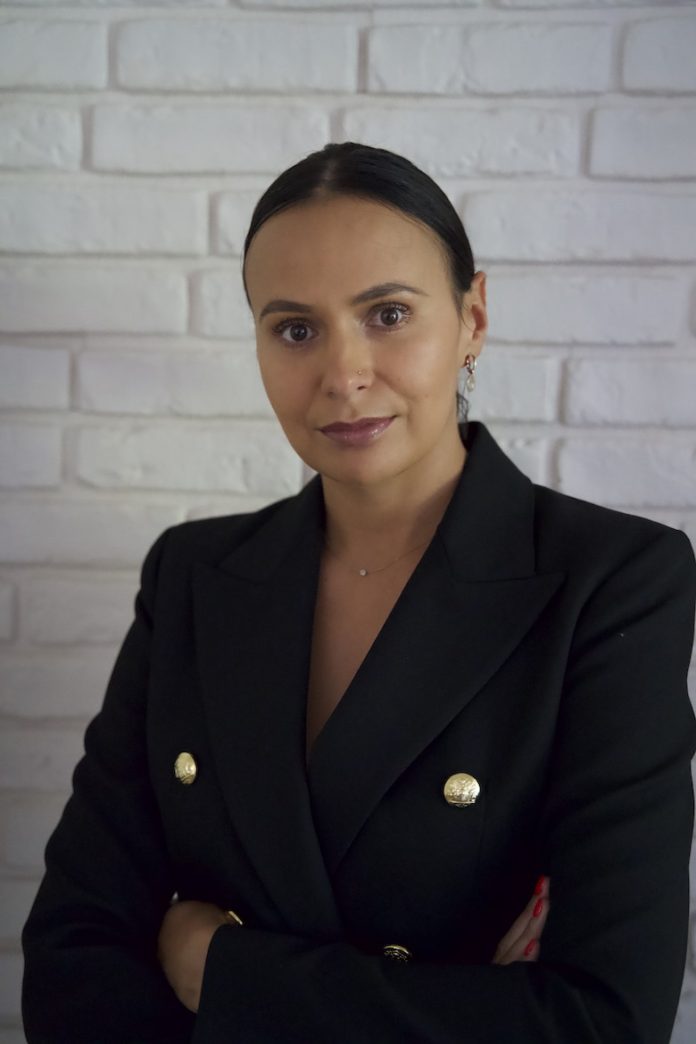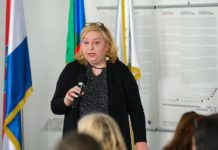Joanna Talewicz has a PhD. in cultural anthropology. She is a researcher, educator, author, activist, co-founder, and president of the Foundation Towards Dialogue (Fundacja w Stronę Dialogu) from Poland. For twenty years, she has been working for the benefit of the Roma community, fighting for minority rights, and her main field of work is the Roma genocide and the Roma refugees. She is a member of the Polish delegation of the International Holocaust Remembrance Alliance (IHRA). Talewicz is the author and co-author of several books and scientific and popular articles.
Although we have often heard the phrase “never again”, the war is raging again in Europe, and members of the Roma community are among its victims and refugees. How do the war and suffering shape national identity and do you have information on how Roma refugees are treated in Poland?
“Never again” is a phrase I hear often during various commemorations. Unfortunately, it has nothing to do with reality. The era of wars, exploitation, and genocide did not end with WWII. It is still going on. In this context, it is difficult not to mention, among others, the war in the Balkans, Syria, Rwanda, the Democratic Republic of Congo, and Ukraine, or the genocide of the Rohingya people. History has taught us nothing and we have not created mechanisms protecting us against the tragedies happening in the modern world. Moreover, we are witnesses to the neutralization of war and the indifference to human suffering. Today, war is brought close to us, we can watch it and see what is happening in places torn by conflicts and genocides. The internet and social media will make it difficult in the future for us to say that we did not know, that we were unaware. Not nowadays and not with such wide access to information. Let us talk about it because after WWII we asked ourselves: how is it possible that this happened? How could this happen in front of the whole world? Back then, not everyone was aware of what was happening. Today, it is difficult to say that we have not seen what was happening, that we were unaware, but more importantly, it is difficult to understand the indifference and passivity towards the tragedy of so many people and nations. The Roma live in the diaspora and thus constitute a minority everywhere, they are the most vulnerable. War and conflicts weaken our position even more. Because who is to fight for us? Who represents us? Without political or economic power, we are always less favored, to put it mildly. Unfortunately, we are currently witnessing another war in which the Roma community becomes a group of second-class citizens. The way in which Roma refugees are treated is difficult to accept. Romani refugees from Ukraine experienced worse treatment not only in Poland, but also in other countries, such as Hungary, the Czech Republic, and Moldova. They were not allowed to the refugee centers and were denied transport and other services provided to the refugees. Responsibility for helping these people was transferred to the Roma organizations without supporting them in any way.
I am the head of the Foundation Towards Dialogue, which supports Roma refugees in Poland, and I must say that the first months of the war were terrible for us. Fortunately, we received support from international humanitarian organizations. We have managed to create a strong network and a team of intervention assistants and mediators for refugees. What’s more, we have signed a cooperation agreement with local authorities in Warsaw and established the Roma Community Center where we offer legal, psychological, and educational assistance. Today we are ready to discuss the wrongs caused and the injustice. This is not new, we all know how we are treated, even in war, even as refugees fleeing from war. We cannot wait for help and we do not wait for it. We act alone and we are able to be effective in our activities. At the Foundation, we managed to develop a model for the integration of Romani people from Ukraine. We build a bottom-up approach in the community and it brings results. Therefore, I can confidently say that we are ready to talk about good practices that should be implemented not only in Warsaw and perhaps not only in Poland.
From your point of view – has discrimination changed over time? How is it supported by stereotypes? Is anti-Romism increasing in Europe?
We have been observing an increase in anti-Romism, and not only in Europe. We have been witnessing a rise in radical, racist, anti-Semitic, and xenophobic attitudes. All this is combined with the contemporary economic, war, refugee, climate, and migration crises. Interesting, but also nightmarish times. A test for humanity, which I will observe with anxiety, but also with the hope that new and better times are to come. I am aware that it is no longer possible to live as we did so far. Capitalism has aggravated social inequalities, and consumerism is destroying our planet and ourselves. Our whole world requires a change and a new order. Unfortunately, this will take time and I have a feeling that there is a difficult period ahead of us. However, I am convinced that we will prevail. And I believe we will become more aware and empathetic as people and society. I am afraid of how the weak will cope, including the Roma who know very well what the status of scapegoat means. However, I know that today we are stronger and more aware, better educated, and ready to create alternatives for our people. We must take care of the weakest and we must hold together because we are even weaker when apart. Let us educate ourselves, let us educate non-Roma, and let us share good practices and solutions that will not allow us to become victims again.
We commemorated another August 2nd – the International Roma Genocide Remembrance Day – Samudaripen. How is the commemoration connected with the strengthening of the Roma identity today?
This day is important to all Roma and Sinti. And it should be important not only to Roma but to all Europeans and beyond. This is our common history. I was born in Oświęcim, the city where Auschwitz-Birrkenau was located. I also remember the first commemoration that my father organized at the beginning of the 1990s. I was 14 at the time and I remember that only several people were with us in the former so-called Zigeunerlager in Auschwitz-Birkenau concentration camp. That has changed. We are in the process of making Roma and non-Roma aware of what European Roma went through. Unfortunately, we still fight for public space, the media still ignores our history, and school textbooks lack information about the fate of Roma during WWII. However, a lot has been done and this is what we should focus on while moving forward. Today, Roma and non-Roma, as well as people representing institutions, organizations, authorities, etc. come to Oświęcim. The most important thing is that Roma youth from all over the world participate in the commemoration, young people who do not have a chance to learn about the history of their nation from school textbooks, This is great, but it is also an important signal that we must go on and do everything possible to educate not only Roma but also non-Roma. This is important not only because of the justice and the memory of the victims but also for the present threats I mentioned earlier.
For a long time, the genocide of the Roma was known as the ‘forgotten genocide”. To what extent do you still consider this to be the case? What is the situation today? Is the Roma genocide being researched in Poland and are your students interested in the subject?
I have already mentioned educational programs. This is the most important thing! A few years ago, ODHIR conducted research on the presence of the genocide of Roma and Sinti in educational programs. The report titled “Teaching about and Commemorating the Roma and Sinti Genocide: Practices within the OSCE Area” was published in 2015. The results of the research are not optimistic. Education on the genocide is not part of the education program in any of the countries surveyed. I believe research and shedding light on new, lesser-known threads will help change this. I lay a lot of hope into the encyclopedia on the Romani and Sinti genocide which will see the light a day in a few years’ time. Thanks to Karola Fings and collaborators, a compendium of knowledge about the most important period in the history of the Roma will be published. I believe it will be an inspiration for researchers and an important signal to institutions and politicians about the importance of teaching Romani history. We already have recommendations, the last ones published by the Council of Europe. It is time to implement them. We must do everything to make real changes, not just wishful thinking.
What advice would you give to young Roma and other young people when remembering the Roma genocide and the importance of this memory?
When I work with young people, I always emphasize that the nightmarish past is not only the past. The perpetrators were not monsters who will never come back – as we often think of them. Such narratives relieve us of the responsibility for what is happening now, creating a false sense of security. It is very illusory and dangerous, and we must remember and understand that these people were in many respects no different from us, from ordinary people. The feeling of danger, crisis, and belief in ideologies made the evil triumph. Let us also remember this in the context of remembrance and education about the Romani genocide. Let us respond to hate speech and discrimination. Let us not be indifferent, let us support the weaker. Especially now. And let us treat education about the past as an important path in building a narrative and deepening the knowledge about the most tragic period in Romani history.












